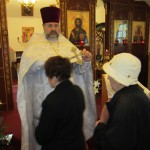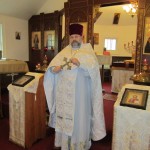On April 22, on Sunday of St. Thomas, or Antipascha the Rector of St. George’s Church, priest Igor Tarasov served the Divine Liturgy.
At his sermon following the Gospel lesson he continued his lectures on Liturgy. Fr. Igor described the actions of the deacon (or of the priest if there is no deacon serving) during the Seraphic Hymn. The star is being taken off the discos and the priest touches the four edges of the discos with the star. The practical reason for that is to open the gifts (the bread) on the discos for further consecration. And the symbolism of that rite of touching or hitting the discos four times is to show how the Angels are praising God standing at the four sides around Him. This is also a symbol of the four Gospels which tell the world about God and about His Good News. In addition, as we read in the book of Revelation, the four animals are standing around the Lamb praising Him. That vision of St. John meant that the four Gospels are preaching the truth about Jesus Christ. Finally, the ritual of hitting the discos has its origin in the ritual of the Jerusalem Temple where the people who brought up the gifts and burning the incense, hit with the small shovel on the plate during the sacrifice.
Fr. Igor also discussed the content of the Anaphora of St. Basil the Great and St. John Chrysostom. He pointed out that both of them describe the mission of our Lord Jesus Christ in redeeming the human race and leaving us the Mystery of His Body and Blood.
After the Liturgy the Rector preached shortly about the celebrated feast. He stressed the importance of faith which is lacked by many people in today’s world. St. Thomas also had doubts and required proof of Christ Resurrection. But when he recognized the risen Lord he believed. Nowadays people do not even wish to believe or believe in one thing but refuse to believe in other truths of faith. “We need to keep the firm faith in order to be called the blessed ones who have not seen, but yet believe”.
In conclusion of the service Fr. Igor distributed the particles of the Artos blessed on Pascha.
St. George Russian Orthodox Church
211-43 46th Ave, Bayside, NY 11361 (Queens)


